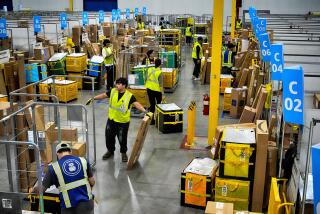China’s economy grows at slowest rate in more than two years
- Share via
Reporting from Beijing — In the final quarter of 2011, China’s economy grew at its slowest pace in 2½ years because of shrinking exports, tighter bank lending and a cooling real estate market.
Compared with the same period a year earlier, the country’s gross domestic product grew by 8.9% in the fourth quarter of 2011, down from 9.1% in the previous quarter, China’s National Bureau of Statistics said Tuesday.
For the year, the world’s second-largest economy expanded by 9.2%, off from 10.4% in 2010.
Though blazingly high by international standards, China’s economic growth is likely slipping uncomfortably fast for the country’s leadership.
Quarter-on-quarter growth slowed to 8.2% between the third and fourth quarters compared with 9.5% between the second and third quarters.
Many analysts expect conditions to worsen as Europe, China’s biggest export market, shows no signs of stabilizing. Consensus is growing that China’s growth could falter further, to around 7.5%, in the first quarter of this year.
That would mark a significant decline because China’s communist government has traditionally eyed 8% as the rate necessary to maintain social stability.
Fears of widespread unrest abounded after China’s economic growth slumped to 6.8% during the depths of the 2008 financial crisis and an estimated 20 million migrant workers were out of jobs.
Beijing responded to that crisis by introducing an unprecedentedly large stimulus package that ultimately fueled the property bubble and high rates of inflation that bind policymakers today.
Inflation grew at a 15-month low in December, but still remains above the government’s target.
With little room for more aggressive stimulus, the central government will likely target policy with greater efficiency to blunt the effects of any serious global economic slump, experts say.
That may include lowering taxes, boosting loans to the private sector and investing more in social services such as healthcare -- in short, anything to wean China off investment as a major engine of growth and to rebalance toward consumption.
“At this juncture, the challenge for policymakers is to implement measures that boost domestic demand without setting back progress made in curbing inflation,” said Jing Ulrich, chairman of Global Markets for JP Morgan.
Such reform will require an acceptance of slower growth in a country that still considers itself in the early stages of development. At $7.4 trillion, China’s economy is still half the size of the United States’.
RELATED:
China housing bubble losing air
Inflation in China eases in December
Apple halts iPhone 4S release in China stores after near-riot
More to Read
Inside the business of entertainment
The Wide Shot brings you news, analysis and insights on everything from streaming wars to production — and what it all means for the future.
You may occasionally receive promotional content from the Los Angeles Times.









